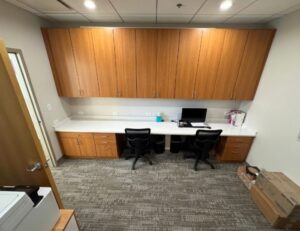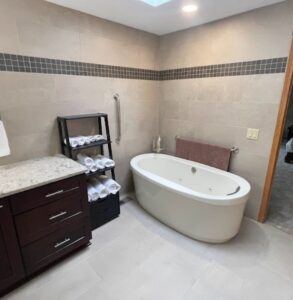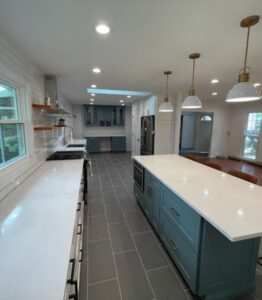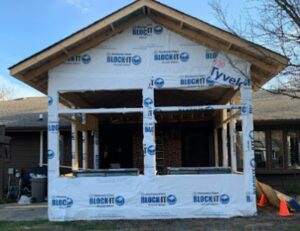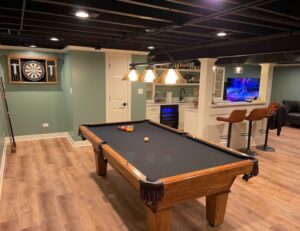In terms of the overall cost to finish a basement, there are a few different ways some contractors come to a price. The truth is there is no “industry standard” regarding pricing so I get this question a lot: “how much does labor cost to finish a basement?” The simple answer is: “It depends on how it gets priced out per the contractor and who you are hiring to perform your basement finishing project.” I briefly touched on this in a previous article “How to Hire a Basement Contractor”. But let’s dive into a little more detail on this subject.
Components of Pricing For Finishing A Basement
It’s going to be difficult to move forward with answering the above question without first defining the various elements that could end up in the pricing for a project, depending on the scope of the work involved. Again, every contractor may do it slightly differently so I can only speak from my own method and process for pricing. Below is a short list of varying line items that end up on my pricing sheet for most basement finishing projects:
Pre-construction Planning and Design
Architectural Drawings
Basement Permitting and Basement Inspection Costs
General Conditions (dumpsters, porta-potties, etc.)
Project Supervision
Demolition
Basement Framing
HVAC
Basement Plumbing
Basement Electrical
Low Voltage
Basement Insulation
Basement Drywall
Basement Flooring
Basement Tile
Millwork (trim, doors, cabinets, stair components, etc.)
Painting
Clean Up
As you can see, there are many different elements that are needed for a basement finishing project –tradespeople are just part of the equation. Typically, most consumers understand that there are too many things to coordinate which is why they hire a General Contractor (the above list incorporates the tradesmen needed, material vendors are yet another list that ends up on my sheets). The term “General Contractor” assumes a couple of things. In the article What is a General Contractor, Matt Viator says “a general contractor is likely needed for any project that requires coordinating several stages or multiple tradespeople to complete the job.” Ultimately, this is why someone would hire a G.C. Someone to be responsible for the coordination and hiring of various trade partners, and vendors and managing the process from start to finish. Let’s take a closer look at some of these line-item components.
Basement Pre-Construction and Planning
Not every construction company does this, but there are outfits that employ a design/build model (Red Cloud Contracting is one of them). What does design/build mean? It means that a consumer has the option of a one-stop shop for their planning, design, and construction needs. One may see this advertised by contractors, designers, and architectural firms alike. Being that each one of these various professional services works towards the same thing, any one of these starting points is a viable way to begin the journey of a construction project.
We have found at Red Cloud Contracting, that our best customers appreciate the process we provide including the pre-construction planning process and those required at this phase in the planning and design. We have partnered with firms like Flint Architects and Luxe Living Home to help provide a full- service experience, a “3D Experience”, so that a client only has to go to one person responsible for figuring out what it takes to make their dream a reality. Of course, this phase of the process takes time, effort, and a monetary investment but it’s important to keep in mind that you get what you pay for. Construction companies that throw proposals out there are less likely to be accurate in their estimating and pricing. Therefore, putting the client at risk of having to pay more throughout the duration of the project or at project completion. As one of my mentors has said: “You either get a bad estimator, or a good contractor – your choice”. So, in terms of “labor” associated with a basement finishing project, the pre-construction planning, and design should be included in the overall price. The professional services required for a construction project such as a designer and architect are certainly not free and each will vary in price depending on the size and scope of the project. Again, many contractors will have this built into their pricing structure and the client will end up paying for this portion of the work either on the front end (before signing a construction agreement) or at the time of signing. Something to consider for sure.
General Conditions and Supervision
Once again, depending on the contractor you are working with, you may or may not see General Conditions and/or Supervision on a proposal or bid sheet. I typically like to break this out a little bit but not in an overly exhaustive way. For me, it’s a way to communicate that there are other factors that go into pricing a construction project apart from direct labor on the job and the materials used to make it happen. For example, when I refer to “General Conditions”, this includes things like dumpsters, porta-potty rentals, equipment and utility fees (if applicable), administrative costs, job site set up, and project supervision costs. These are all elements of running a construction project both directly related to the project as well as running a construction business. Basically, it’s important to understand that there are other “labor” costs when it comes to a construction project. Mainly, support personnel who ensure all the documentation is in order permits are acquired, materials are being procured, and even that the job is running the way that it should. Think of it as the “salaried” individuals. Even though they’re not necessarily clocking in and out of a specific job, they are very much involved in making everything happen.
Tradesmen on the Job
Typically, the largest cost related to a construction project is the individuals who do the physical work. Whether that’s swinging a hammer, pulling wire, or installing flooring, these are the guys and gals who make up the “labor” portion of the project.
Once again, depending on who you are working with, this may get broken out differently on a proposal or bid sheet. As a General Contractor, most times each major trade is broken out separately as shown at the beginning of this article. This is how I typically like to do it. It’s an easy way to break out each trade and list the various tasks and specifications that each trade is responsible for. Again, a nice way to communicate in even more detail to a consumer.
When it comes to an hourly cost for each trade, that’s going to vary quite a bit. For example, a crew who comes in to do the demolition work will probably cost less per man-hour than a crew of licensed plumbers. Not to knock a demolition crew, but their work can be fairly grueling. However, a licensed plumber goes through extensive education and training as well as testing before they are fully licensed. Many of them pay top dollar for this education whether it’s through an approved apprenticeship program or a technical school. Therefore, their labor rates are going to be higher. They are a skilled trade and charge accordingly. The national average for a licensed plumber is roughly $100/hour. That’s quite different than the $17/hour average for a laborer.
Similarly, electricians and HVAC technicians will typically have higher labor rates than a framing carpenter. Electricians go through a similar education and licensing process as would a plumber. HVAC technicians also go through school as well. Again, skilled trades. Framing carpenters may go to school or be involved in an apprenticeship program but it’s not necessarily required since there are no particular licenses for this type of work – at least none that I’m aware of. Therefore, just as a plumber has a higher labor rate than a laborer, electricians will have higher labor rates than a framing carpenter. The average hourly rate for an electrician is roughly $75/hour whereas a framing carpenter might come in at $40/hour.
The above-mentioned are just a few of the many tradespeople that may be needed for a construction project. And their labor rates are only a part of the type of pricing they provide. They also have to vary “general conditions” costs, not to mention materials needed for a specific project. Trust me, the list goes on and on. That’s the beauty of my job and what we get to do here at Red Cloud. As a General Contractor, it’s my job to put all these pieces together like a giant 3D jigsaw puzzle – it can get quite involved. We haven’t even touched on all the various finishing materials and vendors needed for this entire process. Lots to coordinate for sure and unless you work in the General Contracting industry, this can all seem to be very daunting.
What to do now?
As you can see, there are many things to consider regarding a basement finishing project or any construction project for that matter. As mentioned earlier, unless you work in the construction industry, this process may be confusing and scary. However, here at Red Cloud Contracting, we have a process that helps solve this problem of not knowing what to do or how to move forward. It’s called the 3D Experience, and it’s something to get excited about.
The 3D Experience stands for Dream, Design, Deliver. Each step intentionally walks you through the process – considering your dream for the space, your budget, all the considerations mentioned above, and more. The main goal is to make it easy for you and lay out a path to move forward. Being that we offer a firm price for our projects, we realize that this pricing model requires a lot of planning and design work, and we do charge a pre-construction fee. Based on your overall needs for planning and designing the project, there are 3 different options ranging from $500 – $8,000. Take a look at our Bookings page for more information. The first call is always free. We’d love to help walk you through your next basement project!
So, how much does labor cost to finish a basement? The answer is: It varies from trade to trade! Here at Red Cloud, we are committed to walking you through the process so that you can be sure you’re hiring the right contractor, ensuring the top talent is working on your project, and ultimately make your dream becomes a reality.

